-
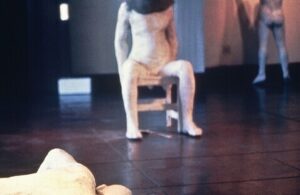
- Friday, September 16, 2022
- Sponsors: Comparative Literature, Levan Institute for the Humanities
- Description: This presentation engages Paul Stopforth’s aesthetic meditations on Steve Biko’s death. Figuring the photographic negative for purposes of counter-documentary, Stopforth sought to challenge the apartheid government’s ideology about anti-apartheid political activists as treasonous, discrediting and undermining the official narrative. The Biko Series’ drawings open up a plethora of questions about the necro-/negro-philia of seeing and the limits of rendering blackness through a fixation on anatomy/biology. Questioning the political promise of figural artistic strategies that mobilize “the corpse,” Zondi ask: Why is it necessary for the world to see the image of the corpse (again) in aesthetic practice, in order to reflect on violence, and what modes of recognition and identification are produced? What is enacted by recruiting/inviting the viewer to adopt such seeing?
-
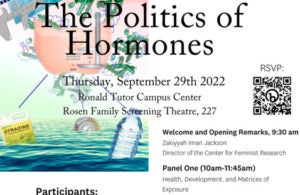
- Thursday, September 29, 2022 (one-day conference)
- Sponsors: American Studies and Ethnicity, Center for Latin American and Latinx Studies, Center of Science, Technology, and Public Life, Gender and Sexuality Studies, Levan Institute for the Humanities
- Description: The one-day conference will investigate dominant and lesser-known narratives about the role of hormones in the embodiment of vertical logics of race, sex, gender, and sexuality. Presenters will engage with how hormones have neurological, cardiovascular, immune, and other effects such as energy level, response to injury, and stress, alongside the conception of hormones in feminist, queer, and trans contexts, that are often discussed in reference to sex-associated bodily developments and reproduction. This broader frame is an attempt to slough off the taxonomical and reified terms of corporeality and identity in the hope that other shapes and constellations of solidarity, inquiry, and knowledge might emerge.
-

- Thursday, September 29, 2022
- Sponsors: Comparative Literature, French and Italian, Latin American and Iberian Cultures, Visual Studies Research Institute, Dornsife Dean of Humanities, Dornsife Office of Graduate Professional Programs, Levan Institute for the Humanities
- Description: Professor Suely Rolnik is a psychoanalyst, arts and culture critic, and curator. Having earned her PhD in Clinical Psychology, she is a professor at the Pontifícia Universidade Católica de São Paulo, Brazil and a faculty member of the independent study program (PEI) at the Museo d’Art Contemporani in Barcelona (MacBa). She is author, among other books, of Micropolítica: Cartografías del deseo in collaboration with Félix Guattari, which has been published in 7 countries.
-

- Monday, October 3, 2022
- Sponsors: Consortium for Gender, Sexuality, Race, and Public Culture, Gender and Sexuality Studies, Levan Institute for the Humanities
- Description: Join Consortium for Gender, Sexuality, Race, and Public Culture director Karen Tongson for a conversation with Karina Longworth, a writer, film historian and podcaster, who is also the creator, producer and host of You Must Remember This: a podcast on the secret and forgotten history of 20th Century Hollywood. Longworth is the author of four books, most recently Seduction: Sex, Lies and Stardom in Howard Hughes’s Hollywood (Custom House, 2018).The two will talk about transposing archival and cultural studies research into audio series for mass audiences, while exploring the links between archival labor, gender, and the different genres and formats through which research finds its expression.
-

- Wednesday, October 5, 2022
- Sponsors: Anthropology, Center on Science, Technology, and Public Life, Levan Institute for the Humanities
- Description: We are celebrating the one year birthday of Experimenting with Ethnography: A Companion to Analysis (Duke University Press 2021, eds. Andrea Ballestero and Brit Ross Winthereik), highlighting how readers have drawn on, been inspired by, and also transformed the book’s provocations through their own pedagogical, research, and scholarly engagements with the text. This online event, hosted by the Ethnography Studio, will be moderated by Andrea Ballestero and Brit Ross Winthereik and will feature commentary by three guest speakers: Marilyn Strathern (University of Cambridge), Dawn Nafus (Intel), and Nikhil Anand (University of Pennsylvania). It will also feature a panel of two of the book’s contributors, Patricia Alvarez Astacio (Brandeis University) and Tone Walford (University College London).
-
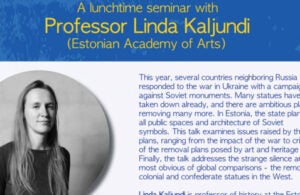
- Tuesday, October 25, 2022
- Sponsors: History Department, Max Kade Institute for Austrian-German-Swiss Studies, Levan Institute for the Humanities
- Description: This year, several countries neighboring Russia have responded to the war in Ukraine with a campaign against Soviet monuments. Many statues have been taken down already, and there are ambitious plans for removing many more. In Estonia, the state plans to clear all public spaces and architecture of Soviet symbols. This talk examines issues raised by these plans, ranging from the impact of the war to critiques of the removal plans posed by art and heritage experts. Finally, the talk addresses the strange silence around the most obvious of global comparisons – the removal of colonial and confederate statues in the West. Linda Kaljundi is professor of history at the Estonian Academy of Arts and curator at the Kumu Art Museum, where she co-curated the permanent exposition on modern Estonian art. Her research focuses on imperial and indigenous imaginaries in the Baltic region, environmental history, and memory politics.
-

- Tuesday, November 1, 2022
- Sponsors: Annenberg School of Communication, International Journal of Communication, Annenberg Center for Collaborative Communication, Levan Institute for the Humanities
- Description: How might we orient to the contested past in order to foster decisive action in the present? Back in 2018, the 50th anniversary of 1968 gave rise to a small industry devoted to commemoration. Scholars and journalists revisited that year’s insurgencies in dozens of essays and books, activists paid tribute to its emancipatory legacy in the streets, and companies exploited it on our screens. Anticipating this popular interest, a group at USC Annenberg took up 1968 as the theme for our first graduate student conference. Participants analyzed media objects and moments from 1968 that had been activated in the service of contemporary social movements, obscured through superficial citation, or omitted from the dominant record. Each case reminded us that history is a battleground; more than just a record to set straight, it is a process of production in which we participate, where even our principled longings in the present can become obstacles to confronting our co-implication with the past. Guest-edited by Clare O’Connor and featuring a Foreword by Robin D.G. Kelley, “Unsettled Debts: 1968 and the Problem of Historical Memory” is a collection of essays based on the 2018 conference proceedings. How, contributors ask, might we revisit the “spirit of ’68” without succumbing to distorted forms of memory such as nostalgia and myth? Join us to launch this Special Section of the International Journal of Communication and consider how we might productively engage with an era that feels distant yet unfinished.
-
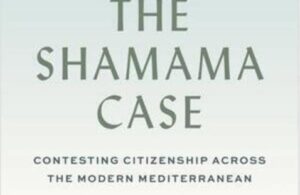
- Wednesday, November 30, 2022
- Sponsors: Gould School of Law, Casden Institute, Levan Institute for the Humanities
- Description: A discussion of Jessica Marglin’s new book, The Shamama Case: Contesting Citizenship Across the Modern Mediterranean (Princeton University Press, 2022). About the Book: In the winter of 1873, Nissim Shamama, a wealthy Jew from Tunisia, died suddenly in his palazzo in Livorno, Italy. His passing initiated a fierce lawsuit over his large estate. Before Shamama’s riches could be disbursed among his aspiring heirs, Italian courts had to decide which law to apply to his estate—a matter that depended on his nationality. Was he an Italian citizen? A subject of the Bey of Tunis? Had he become stateless? Or was his Jewishness also his nationality? Tracing a decade-long legal battle involving Jews, Muslims, and Christians from both sides of the Mediterranean, The Shamama Case offers a riveting history of citizenship across regional, cultural, and political borders. On its face, the crux of the lawsuit seemed simple: To which state did Shamama belong when he died? But the case produced hundreds of pages in legal briefs and thousands of dollars in lawyers’ fees before the man’s estate could be distributed among his quarrelsome heirs. Jessica Marglin follows the unfolding of events, from Shamama’s rise to power in Tunis and his self-imposed exile in France, to his untimely death in Livorno and the clashing visions of nationality advanced during the lawsuit. Marglin brings to life a Dickensian array of individuals involved in the case: family members who hoped to inherit the estate; Tunisian government officials; an Algerian Jewish fixer; rabbis in Palestine, Tunisia, and Livorno; and some of Italy’s most famous legal minds. Drawing from a wealth of correspondence, legal briefs, rabbinic opinions, and court rulings, The Shamama Case reimagines how we think about Jews, the Mediterranean, and belonging in the nineteenth century.
-
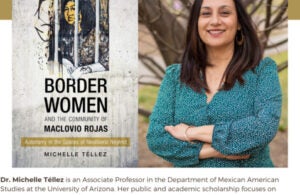
- Thursday, February 2, 2023
- Sponsors: American Studies and Ethnicity Commons, Latinx Geographies Research Cluster, Center for Feminist Research, Equity Research Institute, Levan Institute for the Humanities
- Description: Join CLLAS and ASE Commons for a discussion with Dr. Michelle Téllez about her new book, Border Women and the Community of Maclovio Rojas: Autonomy in the Spaces of Neoliberal Neglect. In this ethnography, Téllez examines state neglect of the U.S./Mexico border region by learning from the community and women-led social movement of Maclovio Rojas situated near Tijuana, Baja California. She demonstrates how women have challenged notions of nation and belonging, contested and invoked citizenship for recognition of land rights, and transformed traditional political roles while forming their own political subjectivity as Maclovianas. Dr. Téllez is an Associate Professor in the Department of Mexican American Studies at the University of Arizona. Her public and academic scholarship focuses on transnational community formations, mothering, and gendered migration along the U.S./Mexico borderlands.
-
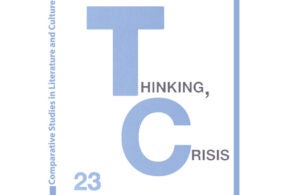
- Thursday, March 2, 2023
- Sponsors: Comparative Literature, Levan Institute for the Humanities
- Description: A two-day Graduate Student Symposium, consisting of a Keynote by Dr. David Marriott, multiple student panels, Film Screening, and Q&A session(s). From the individual to the political (rising fascism) to the global (Climate): crisis. At every register, ‘crisis’ confronts us, and not for the first time. But what is crisis–this word that returns, always familiar, to describe what appears as anything but? Moreover, what does its repeated use say about what it describes, and vice versa? If ‘crisis’ is nothing in-itself but rather a reaction to the breakdown or destruction of present systems, what methodologies could guide us in thinking, conceptualizing, and confronting something that is nothing in-itself but rather a process of witnessing the eventual destruction of the world as we know. It seems that while we continue to live in crisis, and moreover, are made to bear witness to crisis almost on daily basis, we lack critical apparatus to think crisis, to treat crisis as a critical category to navigate the rapidly changing world we live in. The question then is this: what does it mean to think “crisis,” when crisis is what would problematize or at least provoke thinking?
-
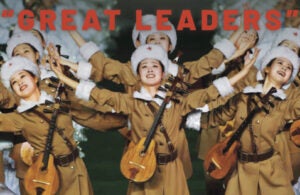
- Wednesday, March 8, 2023
- Sponsors: History, Shinso Ito Center for Japanese Religions and Culture, USC Libraries, Levan Institute for the Humanities
- Description: We are excited and grateful to be in community with Dr Keith Howard, Emeritus Professor of Music and Leverhulme Fellow from SOAS, University of London, as the first voice of the Voices in East Asian Studies and Music project led by Christopher Hepburn, a Postdoctoral Scholar and Teaching Fellow. Join us as Dr Keith Howard takes a deep dive into North Korean ideology, providing an overview, zooming in on two periods of leadership transition – from Kim Il Sung to Kim Jong Il in 1994-1997, and from Kim Jong Il to Kim Jong Un in 2009-2011 – and finally looking at contemporary song production.
-
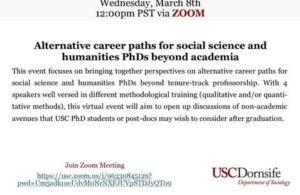
- Wednesday, March 8, 2023
- Sponsors: Sociology, Levan Institute for the Humanities
- Description: This event focuses on bringing together perspectives on alternative career paths for social science and humanities PhDs beyond tenure-track professorship. With four speakers well-versed in different methodological training (qualitative and/or quantitative methods), this virtual event will open up discussions of non-academic avenues that USC Ph.D. students or post-docs may wish to consider after graduation.
-

- Friday, April 14, 2023
- Sponsors: Early Modern Studies Institute, Visual Studies Research Institute, Levan Institute for the Humanities
- Description: USC-Huntington Early Modern Studies Institute: Women in the Making of Early Modern Art and Science, featuring: Paula Findlen, JessicaRosenberg, Nina Gelbart, Anne Secord, and Claudia Swan. Organized by: Daniela Bleichmar and Nicole LaBouff.
-

- Wednesday, April 19, 2023
- Sponsors: History, Classics, Religion, Graduate Program, Levan Institute for the Humanities
- Description: George Kiraz, renowned for his contributions to Syriac studies, speaks of his Bethlehem childhood that shaped the person he is today. His memories offer an intimate look at myriad aspects of Syriac life in Palestine in the 1970s and ’80s: religious identity, brushes with ancient history, conflicts with the Israeli occupation, fraught custodianship of Christian holy places, and his father’s role in the legendary discovery of the Dead Sea Scrolls. The talk will offer an illuminating account to people with a range of interests, such as the modern Syriac heritage and diaspora, the Sayfo genocide, Palestinian history, religious pluralism, and minority communities in the U.S.
-

- Monday, May 1, 2023
- Sponsors: Dornsife Writing Program, Annenberg, Marshall Business Communication Department, Viterbi Engineering in Society, Ahmanson Lab, Levan Institute for the Humanities
- Description: 2023 The Future of Writing: A Symposium for Teachers – Pedagogy, Process, Potential. The Writing Program at the University of Southern California and the Annenberg School of Communication and Journalism invite proposals for The Future of Writing: A Symposium for Teachers, a one-day event in which we look down the road to what is coming next. Come join lively in-person and online interactive sessions on the future of writing (from first-year college writing to journalism, from professional to creative writing). Explore the ever-changing norms of digital pedagogy and how our choices now will shape the classroom praxis of the decade ahead. Keynote Speaker: Maha Bali: American University of Cairo (Virtual). Plenary Speakers: Jeremy Douglass: UC Santa Barbara (In Person), Anna Mills: College of Marin (Virtual)
Header image: The North American Indian, vol. 11, Makah basketry, 1915, USC Libraries Special Collections
Contact Us
Office
3501 Trousdale Parkway
THH 348
Los Angeles, CA 90089
Staff
Director: Daniela Bleichmar
Associate Director: Zach Mann
Assistant Director: Isabella Carr

